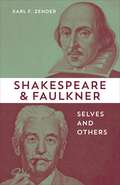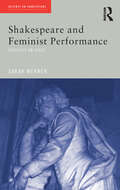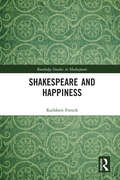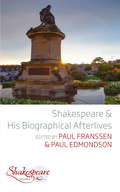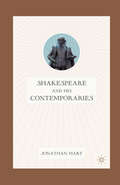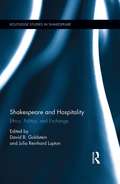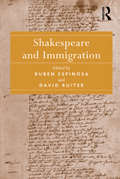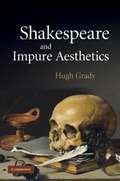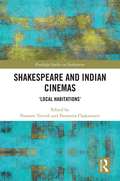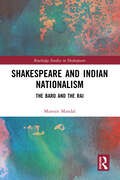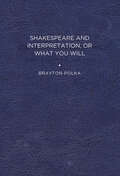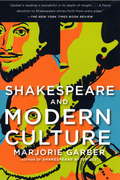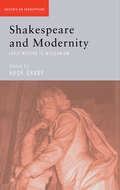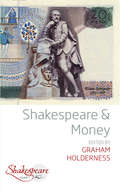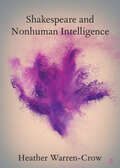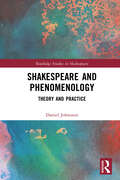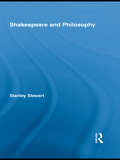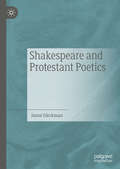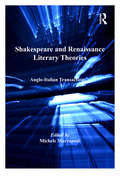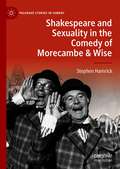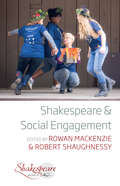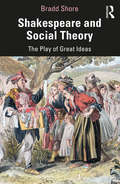- Table View
- List View
Shakespeare and Faulkner: Selves and Others
by Karl F. ZenderShakespeare and Faulkner explores the moral and ethical dilemmas that characters face inside themselves and in their interactions with others in the works of these two famed authors. Karl F. Zender’s characterological study offers insightful, critically rigorous, and at times quite personal analyses of the complicated figures who inhabit several major Shakespeare plays and Faulkner novels. The two parts of this book—the first of which focuses on the English playwright, the second on the Mississippi novelist—share a common methodology in that they originate in Zender’s history as a teacher of and writer on the two authors, who until now he generally approached separately. He emphasizes the evolving insights gleaned from reading these authors over several decades, situating their texts in relation to shifting trends in criticism and highlighting the contemporary relevance of their works. The final chapter, an extended discussion of Faulkner’s Intruder in the Dust, attempts something unusual in Zender’s critical practice: It relies less on the close textual analysis that characterizes his previous work and instead explores the intersections between events depicted in the novel and his own life, both as a child and as an adult. Shakespeare and Faulkner speaks to the power of literature as a form of pleasure and of solace. With this work of engaged and thoughtful scholarly criticism, Zender reveals the centrality of storytelling to human beings’ efforts to make sense both of their journey through life and of the circumstances in which they live.
Shakespeare and Feminist Performance: Ideology on Stage (Accents on Shakespeare)
by Sarah WernerHow do performances of Shakespeare change the meanings of the plays? In this controversial new book, Sarah Werner argues that the text of a Shakespeare play is only one of the many factors that give a performance its meaning. By focusing on The Royal Shakespeare Company, Werner demonstrates how actor training, company management and gender politics fundamentally affect both how a production is created and the interpretations it can suggest. Werner concentrates particularly on: The influential training methods of Cicely Berry and Patsy Rodenburg The history of the RSC Women's Group Gale Edwards' production of The Taming of the Shrew She reveals that no performance of Shakespeare is able to bring the plays to life or to realise the playwright's intentions without shaping them to mirror our own assumptions. By examining the ideological implications of performance practices, this book will help all interested in Shakespeare's plays to explore what it means to study them in performance.
Shakespeare and Genre
by Anthony R. GuneratneProvides a comprehensive survey of approaches to genre in Shakespeare's work. Contributors probe deeply into genre theory and genre history by relating Renaissance conceptions. In this sense, the volume proposes to read Shakespeare through genre and, just as importantly, read genre through Shakespeare.
Shakespeare and Happiness (Routledge Studies in Shakespeare)
by Kathleen FrenchShakespeare and Happiness is a study of attitudes to happiness in the early modern period and in Shakespeare’s plays. It considers the conflicting influences of religion and Aristotelian philosophy in shaping attitudes to the possibility of attaining happiness. By being the first book to focus specifically on the representation of happiness in Shakespeare’s plays, it contributes to feminist approaches to Shakespeare by foregrounding the important role of women in showing the right way to live and achieve happiness. timely criticism, as it considers Shakespeare in the current context of the #MeToo movement providing new insights to studies of the emotions by approaching them from the perspective of research conducted by positive psychologists. This book takes an interdisciplinary approach that combines methodologies from literature, psychology philosophy, religion and history, by emphasizing the richness and complexity of Shakespeare’s exploration of the nature of happiness.
Shakespeare and His Biographical Afterlives (Shakespeare & #6)
by Paul Franssen & Paul EdmondsonNew Shakespeare biographies are published every year, though very little new documentary evidence has come to light. Inevitably speculative, these biographies straddle the line between fact and fiction. Shakespeare and His Biographical Afterlives explores the relationship between fiction and non-fiction within Shakespeare’s biography, across a range of subjects including feminism, class politics, wartime propaganda, children’s fiction, and religion, expanding beyond the Anglophone world to include countries such as Germany and Spain, from the seventeenth century to present day.
Shakespeare and His Contemporaries
by Jonathan HartThis book is concerned with language, genre, drama, and literary and historical narrative and examines the comedy of Shakespeare in the context of comedies from Italy, Spain, and France in the sixteenth and seventeenth centuries.
Shakespeare and Hospitality: Ethics, Politics, and Exchange (Routledge Studies in Shakespeare)
by Julia Reinhard Lupton David GoldsteinThis volume focuses on hospitality as a theoretically and historically crucial phenomenon in Shakespeare's work with ramifications for contemporary thought and practice. Drawing a multifaceted picture of Shakespeare's scenes of hospitality—with their numerous scenes of greeting, feeding, entertaining, and sheltering—the collection demonstrates how hospitality provides a compelling frame for the core ethical, political, theological, and ecological questions of Shakespeare's time and our own. By reading Shakespeare's plays in conjunction with contemporary theory as well as early modern texts and objects—including almanacs, recipe books, husbandry manuals, and religious tracts — this book reimagines Shakespeare's playworld as one charged with the risks of hosting (rape and seduction, war and betrayal, enchantment and disenchantment) and the limits of generosity (how much can or should one give the guest, with what attitude or comportment, and under what circumstances?). This substantial volume maps the terrain of Shakespearean hospitality in its rich complexity, demonstrating the importance of historical, rhetorical, and phenomenological approaches to this diverse subject.
Shakespeare and Immigration
by Ruben EspinosaShakespeare and Immigration critically examines the vital role of immigrants and aliens in Shakespeare's drama and culture. On the one hand, the essays in this collection interrogate how the massive influx of immigrants during the reign of Queen Elizabeth I influenced perceptions of English identity and gave rise to anxieties about homeland security in early modern England. On the other, they shed light on how our current concerns surrounding immigration shape our perception of the role of the alien in Shakespeare's work and expand the texts in new and relevant directions for a contemporary audience. The essays consider the immigrant experience; strangers and strangeness; values of hospitality in relationship to the foreigner; the idea of a host society; religious refuge and refugees; legal views of inclusion and exclusion; structures of xenophobia; and early modern homeland security. In doing so, this volume offers a variety of perspectives on the immigrant experience in Shakespearean drama and how the influential nature of the foreigner affects perceptions of community and identity; and, collection questions what is at stake in staging the anxieties and opportunities associated with foreigners. Ultimately, Shakespeare and Immigration offers the first sustained study of the significance of the immigrant and alien experience to our understanding of Shakespeare's work. By presenting a compilation of views that address Shakespeare's attention to the role of the foreigner, the volume constitutes a timely and relevant addition to studies of race, ethics, and identity in Shakespeare.
Shakespeare and Impure Aesthetics
by Hugh GradyShakespeare and Impure Aesthetics explores ideas about art implicit in Shakespeare's plays and defines specific Shakespearean aesthetic practices in his use of desire, death and mourning as resources for art. Hugh Grady draws on a tradition of aesthetic theorists who understand art as always formed in a specific historical moment but as also distanced from its context through its form and Utopian projections. Grady sees A Midsummer Night's Dream, Timon of Athens, Hamlet, and Romeo and Juliet as displaying these qualities, showing aesthetic theory's usefulness for close readings of the plays. The book argues that such social-minded 'impure aesthetics' can revitalize the political impulses of the new historicism while opening up a new aesthetic dimension in the current discussion of Shakespeare.
Shakespeare and Indian Cinemas: "Local Habitations" (Routledge Studies in Shakespeare)
by Poonam Trivedi Paromita ChakravartiThis book is the first to explore the rich archive of Shakespeare in Indian cinemas, including less familiar, Indian language cinemas to contribute to the assessment of the expanding repertoire of Shakespeare films worldwide. Essays cover mainstream and regional Indian cinemas such as the better known Tamil and Kannada, as well as the less familiar regions of the North Eastern states. The volume visits diverse filmic genres, starting from the earliest silent cinema, to diasporic films made for global audiences, television films, independent films, and documentaries, thus expanding the very notion of ‘Indian cinema’ while also looking at the different modalities of deploying Shakespeare specific to these genres. Shakespeareans and film scholars provide an alternative history of the development of Indian cinemas through its negotiations with Shakespeare focusing on the inter-textualities between Shakespearean theatre, regional cinema, performative traditions, and literary histories in India. The purpose is not to catalog examples of Shakespearean influence but to analyze the interplay of the aesthetic, historical, socio-political, and theoretical contexts in which Indian language films have turned to Shakespeare and to what purpose. The discussion extends from the content of the plays to the modes of their cinematic and intermedial translations. It thus tracks the intra–Indian flows and cross-currents between the various film industries, and intervenes in the politics of multiculturalism and inter/intraculturalism built up around Shakespearean appropriations. Contributing to current studies in global Shakespeare, this book marks a discursive shift in the way Shakespeare on screen is predominantly theorized, as well as how Indian cinema, particularly ‘Shakespeare in Indian cinema’ is understood.
Shakespeare and Indian Nationalism: The Bard and the Raj (Routledge Studies in Shakespeare)
by Manojit MandalShakespeare and Indian Nationalism aims to articulate the reception of Shakespeare by the 19th-century Indian intelligentsia from Bengal and their ambivalent approach to the Indian Renaissance and consequent nationalist project. Showcasing the cultural politics of British imperialism, this volume focuses on six early nationalist writers and their engagement with Shakespeare: Hemchandra Bandopadhay (1838–1903), Girishchandra Ghosh (1844–1912), Purnachandra Basu (1844–unknown), Iswarchandra Vidyasagar (1820–1891), Bankimchandra Chattopadhaya(1838–1894), and Rabindranath Tagore (1861–1941). Drawing on Antonio Gramsci’s theory of hegemony and a host of prominent writers of cultural politics, nationalism and Indian history, this interdisciplinary approach combines postcolonial studies and Shakespeare studies in an attempt to reconcile the existence of an unbridled admiration for an English cultural icon in India alongside the rise of nationalism and a fierce resistance to British rule. The book, finally, moves to re-explore Shakespeare's position in academic, political and popular nationalist discourses in postcolonial India.
Shakespeare and Interpretation, or What You Will
by Brayton PolkaBrayton Polka takes both a textual and theoretical approach to seven plays of Shakespeare: Macbeth, Othello, Twelfth Night, All’s Well That Ends Well, Julius Caesar, Troilus and Cressida, and Hamlet. He calls upon the Bible and the ideas of major European thinkers, above all, Kierkegaard and Spinoza, to argue that the concept of interpretation that underlies both Shakespeare’s plays and our own lives as moderns is the golden rule of the Bible: the command to love your neighbor as yourself. What you will (the alternative title of Twelfth Night ) thus captures the idea that interpretation is the very act by which we constitute our lives. For it is only in willing what others will—in loving relationships—that we enact a concept of interpretation that is adequate to our lives. Polka argues that it is the aim of Shakespeare, when representing the ancient world in plays like Julius Caesar and Troilus and Cressida, and also in his long narrative poem “The Rape of Lucrece,” to dramatize the fundamental differences between ancient (pagan) values and modern (biblical) values or between what he articulates as contradiction and paradox. The ancients are fatally destroyed by the contradictions of their lives of which they remain ignorant. In contrast, we moderns in the biblical tradition, like those who figure in Shakespeare’s other works, are responsible for addressing and overcoming the contradictions of our lives through living the interpretive paradox of “what you will,” of treating all human beings as our neighbor. Shakespeare’s comedies and tragedies, notwithstanding their dramatically different form, share this interpretive framework of paradox. As the author shows in his book, texts without interpretation are blind and interpretation without texts is empty. Published by University of Delaware Press. Distributed worldwide by Rutgers University Press.
Shakespeare and Manuscript Drama
by James PurkisHow did Shakespeare write his plays and how were they revised during their passage to the stage? James Purkis answers these questions through a fresh examination of often overlooked evidence provided by manuscripts used in early modern playhouses. Considering collaboration and theatre practice, this book explores manuscript plays by Anthony Munday, Thomas Middleton, and Thomas Heywood to establish new accounts of theatrical revision that challenge formerly dominant ideas in Shakespearean textual studies. The volume also reappraises Shakespeare's supposed part in the Sir Thomas More manuscript by analysing the palaeographic, orthographic, and stylistic arguments for Shakespeare's authorship of three of the document's pages. Offering a new account of manuscript writing that avoids conventional narrative forms, Purkis argues for a Shakespeare fully participant in a manuscript's collaborative process, demanding a reconsideration of his dramatic canon. The book will greatly interest researchers and advanced students of Shakespeare studies, textual history, authorship studies and theatre historians.
Shakespeare and Modern Culture
by Marjorie GarberFrom one of the world’s premier Shakespeare scholars, author ofShakespeare After All(“the indispensable introduction to the indispensable writer”–Newsweek): a magisterial new study whose premise is “that Shakespeare makes modern culture and that modern culture makes Shakespeare. ” Shakespeare has determined many of the ideas that we think of as “naturally” our own and even as “naturally” true–ideas about human character, individuality and selfhood, government, leadership, love and jealousy, men and women, youth and age. Yet many of these ideas, timely as ever, have been reimagined–are indeed often now first encountered–not only in modern fiction, theater, film, and the news but also in the literature of psychology, sociology, political theory, business, medicine, and law. Marjorie Garber delves into ten plays to explore the interrelationships between Shakespeare and twentieth century and contemporary culture–from James Joyce’sUlyssesto George W. Bush’s reading list. InThe Merchant of Venice,she looks at the question of intention; inHamlet, the matter of character; inKing Lear,the dream of sublimity; inOthello,the persistence of difference; and inMacbeth,the necessity of interpretation. She discusses the conundrum of man inThe Tempest; the quest for exemplarity inHenry V; the problem of fact inRichard III; the estrangement of self inCoriolanus; and the untimeliness of youth inRomeo and Juliet. Shakespeare and Modern Culture is a tour de force reimagining of our own mental and emotional landscape as refracted through the prism of protean “Shakespeare. ” From the Hardcover edition.
Shakespeare and Modernity: Early Modern to Millennium (Accents on Shakespeare)
by Hugh GradyThis in-depth collection of essays traces the changing reception of Shakespeare over the past four hundred years, during which time Shakespeare has variously been seen as the last great exponent of pre-modern Western culture, a crucial inaugurator of modernity, and a prophet of postmodernity. This fresh look at Shakespeare's plays is an important contribution to the revival of the idea of 'modernity' and how we periodise ourselves, and Shakespeare, at the beginning of a new millennium.
Shakespeare and Money (Shakespeare & #7)
by Graham HoldernessThough better known for his literary merits, Shakespeare made money, wrote about money and enabled money-making by countless others in his name. With chapters by leading scholars on the economic, financial and commercial ramifications of his work, this multifaceted volume connects the Bard to both early modern and contemporary economic conditions, revealing Shakespeare to have been a serious economist in his own right.
Shakespeare and Nonhuman Intelligence (Elements in Shakespeare Performance)
by Heather Warren-CrowThe Infinite Monkey Theorem is an idea frequently encountered in mass market science books, discourse on Intelligent Design, and debates on the merits of writing produced by chatbots. According to the Theorem, an infinite number of typing monkeys will eventually generate the works of Shakespeare. Shakespeare and Nonhuman Intelligence is a metaphysical analysis of the Bard's function in the Theorem in various contexts over the past century. Beginning with early-twentieth century astrophysics and ending with twenty-first century AI, it traces the emergence of Shakespeare as the embattled figure of writing in the age of machine learning, bioinformatics, and other alleged crimes against the human organism. In an argument that pays close attention to computer programs that instantiate the Theorem, including one by biologist Richard Dawkins, and to references in publications on Intelligent Design, it contends that Shakespeare performs as an interface between the human and our Others: animal, god, machine.
Shakespeare and Phenomenology: Theory and Practice (Routledge Studies in Shakespeare)
by Daniel JohnstonThis book considers how Shakespeare’s theatre investigates and reveals “Being-in-the-world”. Through the lens of phenomenology (the study of how the world shows itself to conscious experience) Johnston examines how Shakespeare’s texts and dramaturgy reveal aspects of Being. This volume explores philosophical themes in Shakespeare’s drama, including perceptions of stage space and fictional place, temporality, bodies, authenticity, and memory in early modern English staging. It examines how Shakespeare asks the question of the meaning of Being by playing with the distinction between “what is” and “what is not”. The work offers practical performance tips and exercises to connect with modern audiences. Each chapter aims to inspire creative artists in production and rehearsal through a unique focus and provide a critical approach to performance. Through a phenomenological exploration of dramatic possibilities drawn from the key concepts of philosophers such as Edmund Husserl, Martin Heidegger, Maurice Merleau-Ponty, and Edith Stein, Johnston investigates theatre as a practical form of philosophical investigation. Theatre-makers should not only consider the fictional world of the play, but also the historical context of Shakespeare’s world and the contemporary context for connecting with audiences here, today, now.
Shakespeare and Philosophy (Routledge Studies in Shakespeare)
by Stanley StewartTouching on the work of philosophers including Richardson, Kant, Hume, Wittgenstein, Nietzsche, and Dewey, this study examines the history of what philosophers have had to say about "Shakespeare" as a subject of philosophy, from the seventeenth-century to the present. Stewart's volume will be of interest to Shakespeareans, literary critics, and philosophers.
Shakespeare and Protestant Poetics
by Jason GleckmanThis book explores the impact of the sixteenth-century Reformation on the plays of William Shakespeare. Taking three fundamental Protestant concerns of the era – (double) predestination, conversion, and free will – it demonstrates how Protestant theologians, in England and elsewhere, re-imagined these longstanding Christian concepts from a specifically Protestant perspective. Shakespeare utilizes these insights to generate his distinctive view of human nature and the relationship between humans and God. Through in-depth readings of the Shakespeare comedies ‘The Merry Wives of Windsor’, ‘Much Ado About Nothing’, ‘A Midsummer Night’s Dream’, and ‘Twelfth Night’, the romance ‘A Winter’s Tale’, and the tragedies of ‘Macbeth’ and ‘Hamlet’, this book examines the results of almost a century of Protestant thought upon literary art.
Shakespeare and Renaissance Ethics
by John D. Cox Patrick GrayWritten by a distinguished international team of contributors, this volume explores Shakespeare's vivid depictions of moral deliberation and individual choice in light of Renaissance debates about ethics. Examining the intellectual context of Shakespeare's plays, the essays illuminate Shakespeare's engagement with the most pressing moral questions of his time, considering the competing claims of politics, Christian ethics and classical moral philosophy, as well as new perspectives on controversial topics such as conscience, prayer, revenge and suicide. Looking at Shakespeare's responses to emerging schools of thought such as Calvinism and Epicureanism, and assessing comparisons between Shakespeare and his French contemporary Montaigne, the collection addresses questions such as: when does laughter become cruel? How does style reflect moral perspective? Does shame lead to self-awareness? This book is of great interest to scholars and students of Shakespeare studies, Renaissance studies and the history of ethics.
Shakespeare and Renaissance Literary Theories: Anglo-Italian Transactions (Anglo-Italian Renaissance Studies)
by Michele MarrapodiThrowing fresh light on a much discussed but still controversial field, this collection of essays places the presence of Italian literary theories against and alongside the background of English dramatic traditions, to assess this influence in the emergence of Elizabethan theatrical convention and the innovative dramatic practices under the early Stuarts. Contributors respond anew to the process of cultural exchange, cultural transaction, and generic intertextuality involved in the debate on dramatic theory and literary kinds in the Renaissance, exploring, with special emphasis on Shakespeare's works, the level of cultural appropriation, contamination, revision, and subversion characterizing early modern English drama. Shakespeare and Renaissance Literary Theories offers a wide range of approaches and critical viewpoints of leading international scholars concerning questions which are still open to debate and which may pave the way to further groundbreaking analyses on Shakespeare's art of dramatic construction and that of his contemporaries.
Shakespeare and Sexuality in the Comedy of Morecambe & Wise (Palgrave Studies in Comedy)
by Stephen HamrickContextualizing the duo’s work within British comedy, Shakespeare criticism, the history of sexuality, and their own historical moment, this book offers the first sustained analysis of the 20th Century’s most successful double-act. Over the course of a forty-four-year career (1940-1984), Eric Morecambe & Ernie Wise appropriated snippets of verse, scenes, and other elements from seventeen of Shakespeare’s plays more than one-hundred-and-fifty times. Fashioning a kinder, more inclusive world, they deployed a vast array of elements connected to Shakespeare, his life, and institutions. Rejecting claims that they offer only nostalgic escapism, Hamrick analyses their work within contemporary contexts, including their engagement with many forms and genres, including Variety, the heritage industry, journalism, and more. ‘The Boys’ deploy Shakespeare to work through issues of class, sexuality, and violence. Lesbianism, drag, gay marriage, and a queer aesthetics emerge, helping to normalize homosexuality and complicate masculinity in the ‘permissive’ 1960s.
Shakespeare and Social Engagement (Shakespeare & #10)
by Rowan Mackenzie and Robert ShaughnessyShakespeare’s roots in applied and participatory performance practices have been recently explored within a wide variety of educational, theatrical and community settings. Shakespeare and Social Engagement explores these settings, as well as audiences who have largely been excluded from existing accounts of Shakespeare’s performance history. The contributions in this collected volume explore the complicated and vibrant encounters between a canonical cultural force and work that frequently characterizes itself as inclusive and egalitarian.
Shakespeare and Social Theory: The Play of Great Ideas
by Bradd ShoreThis book provides a bridge between Shakespeare studies and classical social theory, opening up readings of Shakespeare to a new audience outside of literary studies and the humanities. Shakespeare has long been known as a “great thinker” and this book reads his plays through the lens of an anthropologist, revealing new connections between Shakespeare’s plays and the lives we now lead. Close readings of a selection of frequently studied plays—Hamlet, The Winter’s Tale, Romeo and Juliet, A Midsummer Night’s Dream, Julius Caesar, and King Lear—engage with the texts in detail while connecting them with some of the biggest questions we all ask ourselves, about love, friendship, ritual, language, human interactions, and the world around us. The plays are examined through various social theories including performance theory, cognitive theory, semiotics, exchange theory, and structuralism. The book concludes with a consideration of how “the new astronomy” of his day and developments in optics changed the very idea of “perspective,” and shaped Shakespeare’s approach to embedding social theory in his dramatic texts. This accessible and engaging book will appeal to those approaching Shakespeare from outside literary studies but will also be valuable to literature students approaching Shakespeare for the first time, or looking for a new angle on the plays.
